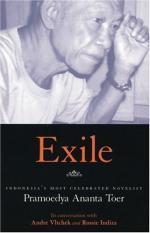|
This section contains 2,887 words (approx. 10 pages at 300 words per page) |

|
SOURCE: Tong, Sebastian. “Unexpected Convergences: Bakhtin's Novelistic Discourse and Pramoedya Ananta Toer's ‘Epic’ Novels.” World Literature Today 73, no. 3 (summer 1999): 481-84.
In the following essay, Tong links Mikhail Bakhtin's theories on literary forms with Pramoedya's Buru Quartet, asserting that the series functions as “the locus of a Bakhtinian convergence between esthetic form and political power.”
Yes, Ma, we fought back … even though only with our mouths.
—Minke to Nyai Ontosoroh1
As prominent opponent and victim of his country's former New Order regime, the literary work of Indonesian author Pramoedya Ananta Toer has been inevitably entangled with his politics. His fourteen-year political imprisonment and his outspoken resistance to the Suharto government have made him a symbol of democratic struggle, with student activists risking jail sentences to defy the ban on his books, particularly the novels of his best-known work, the Buru Quartet.2
Composed orally in the absence of pen and...
|
This section contains 2,887 words (approx. 10 pages at 300 words per page) |

|


